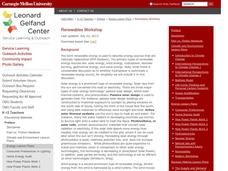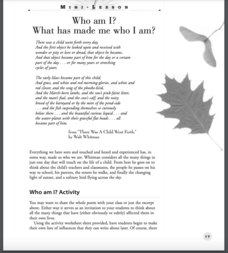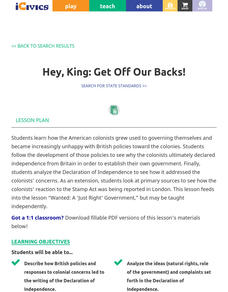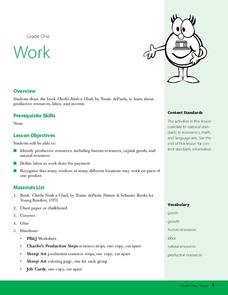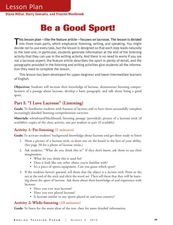Carnegie Mellon University
Renewables Workshop
Youngsters examine resource maps to find out which states are using solar and wind power and discuss as a class various other renewable energy sources. They use a provided data table to record pros and cons to each technology, build and...
Chicago Botanic Garden
Seasons of a Plant
The third in a series of six lessons is an engaging three-part activity defines that discusses phenology, focusing on the cyclic seasons of plants. Pupils then observe phenology outside before determining how climate change can...
Scholastic
Who Am I? What Has Made Me Who I Am?
"Everything we have seen and touched and heard and experienced has, in some way, made us who we are." Your young learners will use this resource to create lists of influences (people, animal, nature, places, etc.) in their lives and to...
Tell City Schools
The Cay
Support your instruction of The Cay by Theodore Taylor with this extensive unit of materials. Provided here are prereading activities, worksheets and discussion questions for the entire book, and reading quizzes that you can use to check...
Sea World
Ocean Discovery
Immerse your young marine biologists in the world of marine animals. The lesson includes several activities that are age-appropriate for preschoolers and kindergartners, including coloring pages, gluing feathers and sand onto paper...
Council for Economic Education
Great Civilizations Develop around Rivers
If you lived in prehistoric times, what kinds of choices could your family make to increase their chance of survival? By making similar decisions in a simulation game, participants discover how specialization creates both opportunity and...
Council for the Curriculum, Examinations and Assessment
Managing Change
"I don't want change; I want swiss!" As Willy Loman bemoans in Arthur Miller's Death of A Salesman, accepting change can be a real challenge. The aim of this session is to encourage class members to see the naturalness and inevitability...
Teach Engineering
Curb the Epidemic!
Class members use an applet on the Internet to simulate the spread of a disease. The simulation allows individuals to determine two nodes to vaccinate to limit the number of nodes infected. By running several simulations, scholars can...
European Schoolnet
Chemistry: All About You
Developed for the 100-year anniversary of Marie Curie's Nobel Prize, a book offers lessons and activities to interest scholars in chemistry. It is divided into modules, so you can pick information from each to create your own lesson...
American Museum of Natural History
What is the Greenhouse Effect?
Without the greenhouse effect, Earth would not be inhabitable. A thorough online resource describes the greenhouse effect and how it occurs. The source highlights the different types of gases that work together to absorb the sun's...
iCivics
Hey, King: Get Off Our Backs!
Young historians explore the reason American colonists were unhappy under British rule. Class members complete hands-on activities and participate in a group discussions to understand why colonists drafted the Declaration of Independence.
American Physiological Society
What Environmental Conditions Lead to the Hatching of Brine Shrimp?
Will changing the environment in which brine shrimp live impact their reproductive success? Young scientists get hands-on experience studying the habitat of brine shrimp in a two-week immersion instructional activity. The teacher's guide...
King Country
Lesson 26: HIV/AIDS & Other STDs - Day 3: HIV/AIDS
The third lesson plan in the three-part series on HIV/AIDS and other STDs considers how these diseases are passed, how to protect against them, and risky and safe behaviors. The discussion of condom use and sexual behaviors are explicit.
US Department of Homeland Security
Psychological First Aide (PFA) for Students and Teachers
Listen, protect, connect! Using the resource, teachers learn how psychological first aid helps scholars adjust after a crisis or school emergency. They discover how to observe changes in pupils' school performance, listen and offer...
Cornell Lab of Ornithology
Life In A Nest: Exploring Life Cycles With Bird Cams
Why read about it when you can watch it happen? Bird cams make it possible for learners to experience the life cycle of a bird in real time! An engaging set of lessons provides activities to connect their learning to bird cam...
Curated OER
The Impacts of Human Activities on Biodiversity in New Haven County
Students discover how plants and animal ecosystems are affected by the growth of a city. In this ecology lesson, students study and observe a plant over a period of time. They develop a creative presentation of their data and share them...
Curated OER
Seashell Painting
Let nature inspire your budding artists. They paint seascapes on actual seashells. First, they observe the seaside, then they paint what they see (image or in person) on the inside of a white shell.
Curated OER
What Parts of a Plant Do We Eat?
Did you know that tomtoes and cucumbers are actually fruits? Biology or botany beginners read about the function of flowers and fruit and find that some food items commonly called vegetables are, by definition, also fruits! Give learners...
Curated OER
Living vs. Non-living
Students go on a nature walk and observe and discuss the living and non living things they see in the ecosystem. For this living and non living lesson plan, students complete a connecting string activity to simulate an ecosystem.
Curated OER
Work
Learners identify productive resources. For this economics instructional activity, students read the book Charlie Needs a Cloak and discuss productive resources the character used in the book. Learners participate in a simulated factory...
Curated OER
Be a Good Sport!
Learners explore the sport of lacrosse to improve their reading and grammar skills. In this reading and grammar lesson, students read and discuss the sport of Lacrosse. Learners complete a Cloze activity, a grammar activity, and a...
Curated OER
Sunday School Inspiration Lessons
Many activities related to the Chrisitan religion are included in this lesson about storytelling; students create their own Bible related art from stickers, stamps, t-shirts and hats. Puppets also help to to retell Bible stories and...
Curated OER
Flower Painting/Printmaking
Using old or donated flowers, little learners create flower prints. They discuss the colors found in nature, paint a background, and then create flowers for their pictures by dipping and pressing real flowers onto their paper.
Curated OER
Soil Porosity, Moisture Content, pH, and Density
This lab activity does not have to be done with AP environmental scientists. It can also be done with middle to high school earth scientists. The procedures aren't complex. Learners determine the density of dry and wet sand in order to...


